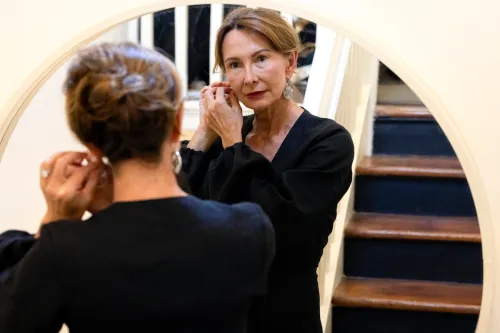6 Questions You Should Never Ask a Woman, Etiquette Experts Say

One of the many unavoidable truths about being human is that you will inevitably put your foot in your mouth during some conversation or another. However, it’s worth noting that all too often—thanks to heightened societal scrutiny—it’s women who find themselves on the receiving end of these unflattering flubs.
The good news is that where there’s a pattern, there’s also usually a solution. Etiquette experts say there are a handful of topics that you can categorically avoid to reduce your risk of offending the women in your life.
Not sure if your particular question may be a faux pas? Read on to learn which six questions you should never ask a woman, and why they’re considered so wildly inappropriate.
RELATED: 6 Times You Should Never Hug Someone, Etiquette Experts Say.
1
“Are you pregnant?”

It should go without saying that you should never ask a woman whether she is pregnant. If she is in fact expecting—and if that pregnancy is happy news—she’ll share that information when the timing feels right for her.
By asking and getting it wrong, you also run the embarrassing risk of insulting the woman deeply. “This question assumes a woman’s physical appearance is an indicator of pregnancy, which can be offensive and hurtful if she is not actually pregnant,” says Jules Hirst, founder and owner of Etiquette Consulting.
Other questions about fertility and family planning are also off-limits, she says. For instance, asking whether someone plans to have more children in the future “can broach sensitive topics that are a minefield of emotions and personal circumstances,” she tells Best Life.
Jodi RR Smith, founder and owner of Mannersmith Etiquette Consulting, agrees that this topic is generally off-limits. “Unless you are her doctor or her partner, you should not be asking any specific or direct questions about her fertility,” she advises.
2
“Is that your natural hair color?”

It’s no secret that people tend to pore over women’s appearances—and that many women feel they must walk a fine line between meeting sky-high beauty standards and appearing un-self-obsessed. This is just one of many reasons that it’s inappropriate to call any additional attention to a woman’s beauty routine—especially if she hasn’t initiated the conversation.
“Hair color and grooming choices are personal matters. Questions regarding them can make a person self-conscious about their appearance,” says Hirst.
RELATED: 8 “Small But Toxic” Things to Stop Saying to Your Partner, According to Therapists.
3
“Why are you single?”

A person’s relationship status can also be a touchy topic, regardless of their gender. However, it’s worth remembering that many women face disproportionate pressure to find a partner sooner in life, as well as heightened criticism for intentionally staying single or childless.
“This question is intrusive because of the implication that being single is undesirable or abnormal. It may also bring up personal circumstances the person may not wish to discuss,” Hirst says.
4
“Have you had any cosmetic surgery?”

If you should avoid asking a woman about her beauty routine, you should under no circumstances ask her whether she has had any cosmetic surgery—or if she would like to.
“Inquiring about someone’s cosmetic procedures implies judgment or dissatisfaction with their natural appearance,” says Hirst. “It is important to respect personal choices and boundaries” by allowing these topics to remain private unless a woman brings them up herself, she adds.
RELATED: The 4 Questions You Should Never Ask Your Server, Experts Warn.
5
“Are you sure you want to eat that?”

Women are constantly bombarded with conflicting, confusing, and unhealthy messages about their weight and bodies. While many people now understand that asking a woman her weight is rude and intrusive regardless of her size, far fewer people extend this concept to commenting on what a woman eats.
“Questions about food choices are inappropriate and judgmental,” says Hirst, who argues you should never second guess a woman’s choice to eat a particular food. She adds that these types of questions can contribute to body image issues, a problem already plaguing far too many women.
Smith agrees that weight-related questions and comments should be forbidden, whether the person’s weight has gone up or down. This includes “subtle” questions about diets or exercise plans, or remarks about weight loss that you view as complimentary but which could be perceived as judgmental of the person’s previous weight.
6
“Is that what you’re wearing?”

You only need to look to Jonah Hill’s recent text threads—and Twitter’s response—to know that the way a person dresses is deeply personal, and not something a partner should dictate. Hirst says this can become even more insulting when you add your own gender expectations into the mix.
“Questioning someone’s attire based on gender norms implies judgment and disregards personal preferences or comfort,” Hirst notes. She suggests that asking a woman why she lacks a more feminine or masculine style once again puts her physical appearance in the spotlight in ways that can feel invasive and critical.
For more etiquette tips sent directly to your inbox, sign up for our daily newsletter.
…So, what’s left to talk about?

While these are just a few of the topics that are likely to make women uncomfortable, it’s generally wise to avoid anything that you think could overstep her personal boundaries—for instance, guessing her dress size or probing the details of her sex life. Thankfully, this should still leave a wealth of topics for you to discuss without risk of offense.
Unsure of whether it’s OK to broach a touchy subject? The experts say it’s best not to take that leap, especially if you’re still getting to know someone. Instead, allow her to steer the conversation for a while, and pay attention to the topics that she finds interesting and comfortable to discuss.
However, you can wade carefully into new territory if a woman makes it clear that she’s open to it. “If she brings up a topic, you may then continue the conversation,” Smith says.